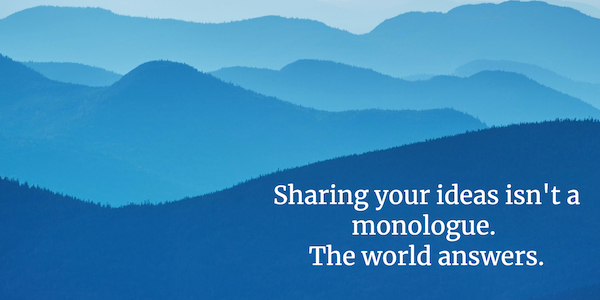
Writing seems like a one-way communication, whether you’re publishing a book or a blog post. Although you can envision your audience, they aren’t with you. You take a deep breath and send your work out into the world.
You can’t see what happens next. But sometimes the world answers back. Faintly. Often enigmatically.
Pay attention to those signals.
They may show up in reviews, in emails, in mentions of your book by people on podcasts. (You may have to search to find those.)
Authors Who Listen
My latest book Get the Word Out shares stories of authors who listened to the messages from the world and took action on what they found. Here are a few:
Karen Catlin started an anonymous Twitter handle (@BetterAllies) focused on being an ally in the workplace. As her audience grew, they told her what they needed next from her, which led to many things, including her book Better Allies. As Karen reports, “I started out to change the world, yes, but I had no idea I would speaking, writing a book or two, and having this newsletter.” She listened and responded.
Michele Wucker wrote an excellent book about obvious risks that we see coming and fail to act on, called The Gray Rhino. She wrote the book for policy makers and corporate leaders and financial professionals—and the metaphor of the gray rhino has taken hold. But people kept telling asking her about the impact of the theory on their personal lives. The persistence of that feedback led her to write You Are What You Risk: The New Art and Science of Navigating an Uncertain World.
Kim Scott was dismayed by people using bestselling book Radical Candor as an excuse to be a jerk in the workplace. (How did she discover this? The parodies in Dilbert and on HBO’s Silicon Valley were loud responses from the world!) She listened and responded in multiple ways, including writing a new book Just Work: Get Sh*t Done, Fast & Fair.
Detecting the fainter signals

Sometimes the responses from the world are quiet and subtle. They show up in conversations you don’t take part in: a mention in someone’s blog or podcast, a review on a site you don’t check often, or a comment on a social media post.
You may discover that your book has resonated with someone outside your ideal audience, and that discovery opens new avenues to explore.
Kristi Dosh describes how she started blogging about the business of sports and discovered that the posts about college football were the ones that received the most comments, shares, and feedback. She took that clue to redirect her focus and write her book Saturday Millionaires.
Social media may be toxic at times, but it’s also a good listening post for the positive responses.
Sometimes what you learn doesn’t change your course, but gives you energy to keep going. The world’s responses may validate and inspire you—and that’s necessary in a world filled with negative responses and cranky reviewers.
Are you listening?
How about you? What are you writing for the world, and are you paying attention to the responses from the world at large?
If you’re working on a book, you don’t start hearing back from the world until the book is out—and that’s a pretty long course. Find a way to start those conversations earlier:
- Write and publish blog posts about your ideas.
- Test your ideas in other forums, like webinars or talks
- Have actual human conversations—I would say “face-to-face” but for now it’s “face-to-screen-to-face”
- Engage with early readers who are part of your idea audience
Do you respond?
As a reader, one of the most generous things you can do is to turn up the volume on your part of the conversation for a book you enjoy.

Reach out to an author and let them know about the impact their book has had on you. Write a review and let everyone know.
Hold up the reader’s side of the conversation.
Remember, writing is all about human communication and connection. Ideas, thoughts and experiences travel between our minds, through the magic of the written word.
Writing connects us. Cultivate that connection.
More Like This
Find more stories of authors with a purpose in Get the Word Out.
Listen to (or read) my interviews with Karen Catlin, Michele Wucker, Kim Scott, and Kristi Dosh.